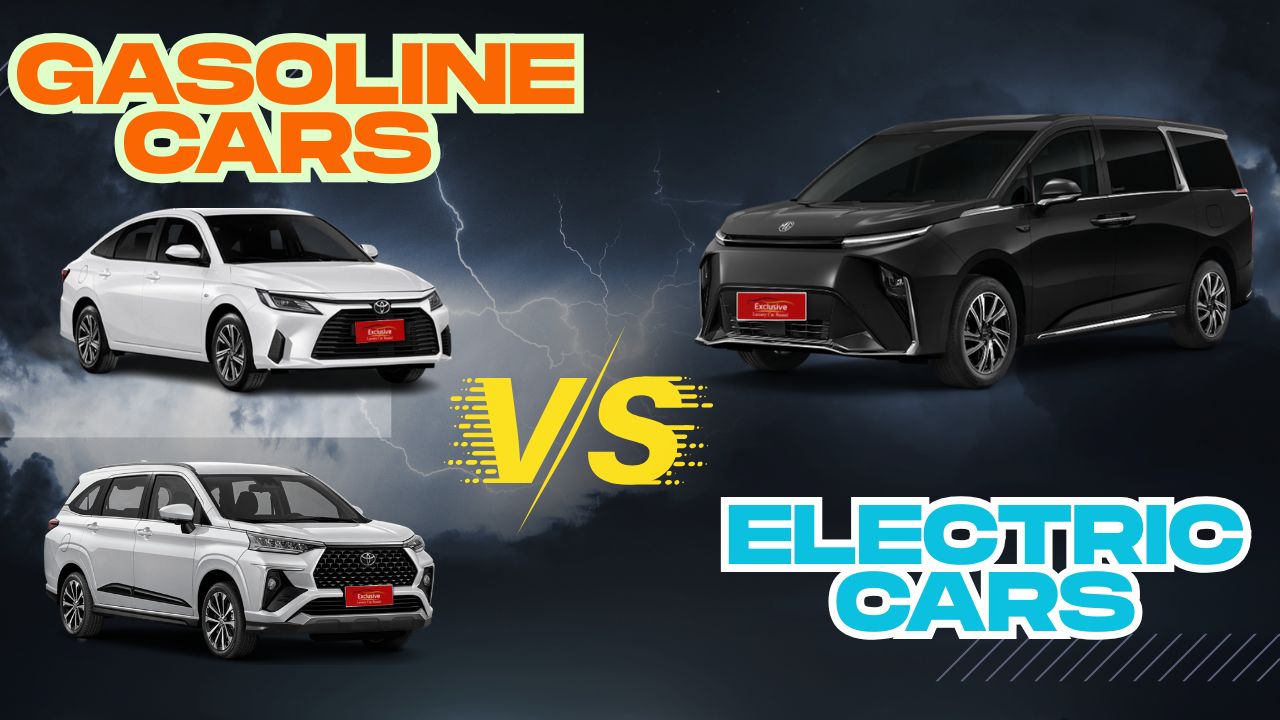What is an Electric Vehicle (EV)? Get to Know the Trend of Cars Gaining Popularity in 2025
An Electric Vehicle (EV) is a car that is powered by electricity instead of gasoline. It uses a battery as the main energy source to supply power to the electric motor, unlike conventional vehicles that use an internal combustion engine that burns fuel to propel the car.
In the past, gasoline-powered cars were the primary choice. However, today we can clearly see the negative effects of burning fossil fuels, such as issues with PM2.5 dust, air pollution, and global warming, which have worsened every year. Electric vehicles have thus become one of the solutions that many people are now focusing on, as they do not emit exhaust pollutants and can help reduce carbon footprints effectively.
2025: The Golden Year of Electric Vehicles
2025 is considered a year when EVs are much more accessible, thanks to government policies that support the industry, such as reducing import taxes and EV vehicle taxes, as well as expanding the charging station network nationwide. Additionally, the price of EVs has dropped significantly, as battery technology has advanced rapidly, resulting in higher capacity, longer driving range, faster charging, and, most importantly, longer-lasting batteries than before.
Why are more Thai people choosing EVs in 2025?
- More cost-effective than gasoline: The cost of charging an EV for a given distance is much cheaper than gasoline, especially when charging at home.
- Environmentally friendly: EVs reduce air pollution and help address issues like PM dust and global warming.
- Lower maintenance costs: EVs don’t have engine oil or exhaust systems, meaning repair and maintenance costs are lower than gasoline vehicles.
- Quiet and smooth driving experience: The driving experience is different, with no engine noise, and the car provides instant torque.
Before Deciding to Buy an Electric Vehicle in 2025
For anyone who is still uncertain about switching to an EV, it’s a good idea to start by researching the pros and cons of EVs, comparing popular models in 2025, and evaluating whether your driving habits align with EV usage. For example, check if there are charging stations near your home or workplace, and how often you plan to drive long distances.
-
For those who are hesitating whether to buy an EV car or not, if you are still not sure, you can Monthly electric car rental You can try it first. If you like it, then decide to buy it.
- You can read more at Compare 5 EV Charging Station Providers in 2025
5 advantages of switching to electric cars instead of petrol cars
1. Environmentally friendly
Electric cars are environmentally friendly. With a process system that uses electricity instead of oil, it helps reduce the combustion of fuel, which is part of the cause of air pollution. Turning to electric cars helps reduce carbon dioxide emissions into the air. This is an advantage and highlight of EV electric cars in terms of environmental friendliness. Because the driving process of the car mainly uses an electric motor, there are no direct emissions from the exhaust pipe. This helps reduce carbon dioxide (CO2) or other pollutants into the outside atmosphere. In general, these electric cars will help reduce carbon dioxide emissions better when charged with clean energy sources or renewable energy. This is different from gasoline-powered cars that are driven by fuel combustion, which will release pollution directly into the air, such as carbon monoxide (CO) or nitrogen oxides (NOx). Because electricity is considered easy to access. Because it is a basic necessity for life. So even if you travel near or far, electric cars can still charge at charging stations.
2. Reduce noise pollution
Electric cars are so quiet that you can barely hear them. Because the driving mechanism does not require ignition to burn, there is no noise when driving. And the operation of the electric motor is much quieter than the engine. Reduce noise pollution Because the driving mechanism does not require ignition to burn, there is no noise when driving. And the operation of the electric motor is much quieter than the engine, with higher efficiency. Electric cars use electric motors that have more torque from the start, resulting in better acceleration than cars that use gasoline, making the engine noise of electric cars quieter than gasoline cars.
3. Save costs
Save costs because electric cars do not have engines, so they do not need fuel to burn. In addition, electric power is cheaper and less volatile than oil prices. In terms of maintenance, electric cars only have electric motors as the power that makes the car move. There are no liquids or fluid filters that need to be maintained regularly, helping to save on the cost of taking the car to the service center. The cost or energy cost is one of the top factors that makes most people start to be interested in electric cars. When compared to the average energy cost of cars that use gasoline or diesel, the average cost is approximately 30-40 baht per liter.
As for electric cars, the energy costs vary depending on the type of charging, such as
- Charging at home via a TOU meter, the electricity cost will be approximately 2.6369 baht per unit.
- Charging with DC Fast charge at public charging stations There is usually a service charge of around 7.5 baht/unit.
Which 1 unit of electricity can drive an electric car for about 4-7 kilometers/unit. If comparing the energy cost per kilometer, it is found that electric cars are more economical.
- Electric cars have a starting energy cost for travel of about 0.37 baht/1 kilometer.
- Oil cars have a starting energy cost for travel of about 1.76 baht/1 kilometer.
4. Smooth speed
EV cars can start off very quickly. Another highlight that makes electric cars worth watching right now is that they have a smooth speed system. Because the use of motors has maximum torque from the first second of stepping on the accelerator pedal, which means the force used to send power to the engine to make the car move. A car with good torque will help the car start off better. It can accelerate efficiently. It also helps increase the ability to transport heavy objects to move smoothly. If you have the opportunity to test drive or sit in a 100% electric car once, you will feel the silence that comes with the acceleration that is immediate. Press it and it comes immediately. No need to wait for the revs and there is no noise like an engine. Which is the power that comes from driving with an electric motor. Choose to use the performance of the electric motor as a highlight in terms of acceleration. That is far superior to cars that use conventional engines.
5. Charge the battery at home
It is certain that the highlight that makes electric cars have an advantage over combustion engines is that they can be charged at home. There is no need to reserve time to drive around to find a charging station. Importantly, it can be charged at night and ready to use in the morning.
1. Normal Charging (AC Charger)
AC charging, or Normal Charging, is a process where alternating current (AC) electricity flows through a charger known as a Wallbox, which is installed at home. The electricity then enters the vehicle’s On Board Charger to be converted into direct current (DC) before being stored in the battery.
It typically takes about 4 to 16 hours, depending on the battery size and power capacity.
This method is ideal for overnight charging, for example, charging at night and using the car in the morning.
Cost-effective: Many homes opt for the "Special Nighttime Electric Rate" package from the electricity company, which helps significantly reduce daily travel costs.
To learn more about charging via a Home Charger, click here: https://www.youtube.com/watch?v=36Zen49clXw&t=34s
2. Fast Charging (DC Fast Charge)
DC Fast Charging uses direct current (DC) electricity to charge the vehicle directly, bypassing the On Board Charger, which saves a lot of time. This method is ideal for use outside the home or in situations where the car needs to be ready quickly.
Charging typically takes only 30 minutes to 1 hour to reach 80% battery capacity.
DC chargers are usually installed at public charging stations, such as shopping malls, gas stations, or rest stops along highways.
In 2025, there are several DC charger options available, ranging from 50 kW, 120 kW, to 300 kW for newer vehicle models that support high-speed charging.
To learn more about charging via a charging station, click here: https://www.youtube.com/watch?v=WEMS99M1YPo&t=361s
Summary: Charging at Home is the Main Choice for New-Era EV Owners
In 2025, most EVs support both AC and DC charging, giving users flexible options for planning their usage. Having a home charger has become a trend among EV owners, as it saves both time and money in the long run, especially for those who use their cars for daily commuting.
To learn more about the difference between AC and DC charging, click here: https://www.youtube.com/watch?v=_LxHEFep3lk
Comparison table of electric vehicles (EVs) and petrol vehicles
|
Comparison list |
EV |
Oil truck |
|
Energy source |
Electricity, charge at home or at a charging station |
Fuel, refuel at gas stations nationwide |
|
Environmental pollution |
Reduce toxic gases, environmentally friendly Electric cars are effective in reducing greenhouse gas emissions and air pollution. Because electric cars use electricity, all in the energy production process and driving, they can reduce the impact on the environment very well. |
Oil creates air pollution. Especially old cars or cars that are not properly maintained, when driven, they release a lot of gases that pollute the air, such as carbon monoxide, carbon dioxide, nitrogen oxides, etc., which affects both the natural environment and human health. |
|
Drive system |
Electric motor |
engine |
|
Maintenance cost |
EV cars today are still quite expensive because the whole car is full of cutting-edge technology and innovations that are used. |
High cost. Gasoline cars often have many expenses, such as energy costs for refueling. Especially nowadays, the price of gas is quite high, averaging 3 baht per kilometer. However, it also depends on the size of the car and usage behavior, including high maintenance costs. |
|
Technology and innovation |
Today's EV cars are full of cutting-edge technology and innovations. |
There are many models and brands of gasoline-powered cars for us to choose from, and some models are obviously cheaper. The use of advanced technology and innovation is still less than electric cars. |
|
Noise pollution |
Reduce noise pollution: Since the driving mechanism does not require ignition for combustion, there is no noise when driving. The operation of electric motors is much quieter than engines. |
Loud engine noise: Gasoline-powered cars have loud engine noises. If the car is an older model or has not been properly maintained, it will create several times more noise pollution. |
|
Consumption Rate Price |
The average consumption rate is around 0.6 - 1 baht per kilometer. |
The average consumption rate is 3 baht per kilometer. |
In summary, EV electric cars are cars that use an electric power system instead of using oil. The highlight that makes electric cars interesting is the use of clean energy that is friendly to the environment. In addition, there are many advantages and disadvantages of electric cars, such as less maintenance than combustion cars, saving costs, and being able to charge at home. However, using electric cars still has some limitations, such as not having enough charging stations in many areas in each province.
Fuel consumption rate compared between petrol and electric cars
- Petrol cars: Fuel consumption rate will average 3 baht per kilometer
- Electric cars: Fuel consumption rate will average 0.6 - 1 baht per kilometer
Note :If you are interested in more information about electric trains, click here.
- Top 5 electric cars in 2024 that are popular and cost no more than a million!
- How much does it cost to rent an EV to drive yourself in Nonthaburi?
- Electric cars 2024, which model should I buy? Compare EV car prices
Contact channels to book an electric car rental with us
• Line: @exclusivecar
• Phone number: 02-1260718
• Website: Electric car rental
• Email: info@exclusive.co.th









